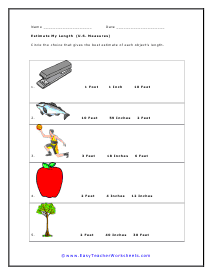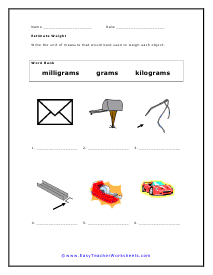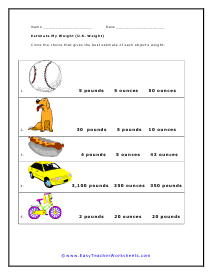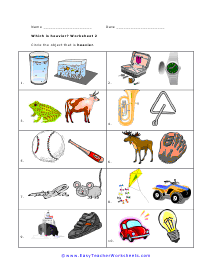Collecting data is a critical skill in the research process. These worksheets help students grasp the concept of qualitative observations. These observations can be general appearances of things to the more advanced sorting of objects and items. These worksheets begin by helping refresh the students understanding of units of measure and common comparisons in measurement. We advance on comparing various measures of multiple objects. This series of worksheets can be invaluable for improving your student's ability to measure objects and their overall observation skills.
Print Collecting Data Worksheets
Click the buttons to print each worksheet and associated answer key.

What My Unit of Measure?
Match the unit of measure to its abbreviation. You will be given a series of choices in the word bank.

What My Unit of Abbreviation? Part 2
Find the measure and its unit. This reverses what we did on the previous worksheet.



Which Is The Biggest?
Put these objects in order. You will place numbers under them to signify size.







Arrangement by Weight Part 2
Place a 1 under the lightest object. Place a 3 under the heaviest object.




Estimate My Length (U.S. Measures)
Circle the choice that gives the best estimate of each object's length.








Which is Lighter? Worksheet 2
Look at each of the rows and decide which of the objects in that row are lighter.
Why Is It Important to Collect Data?
When making decisions, it is crucial to have sufficient data to back our claims. Otherwise, we may find ourselves on a pile of wrong decisions and be forced to bear what would have been preventable predicaments.
It is important to collect data because it equips us with the correct information, guides us in understanding certain phenomena, helps us explain and defend our arguments, and prevents us from making wrong conclusions that may impact our lives and others.
Data is basically any fact that you can quantify to any degree. They can be measures, observations, numbers, and even words. Science was built on the use of information and statistics and interpreting it to find or determine natural truths. Compiling information and how we do it is just as important as the results we find from it. There are many ways that the collection process can interfere with the interpretation phase. This process is not reserved to the science classroom or lab. Just about all forms of business and industry collect data and analyze it regularly to best serve their customers, clients, employees, and investors. Your goal with any information collection process is to cast the net wide enough to get a real representative sample of data from what you are analyzing. To do this successfully there are a number of things that you should take into consideration. Your first goal should be to establish a clear process and strategy for taking in and storing this information. This starts with determining the type of information you are looking to collect and what types are acceptable and unacceptable. Once you have gathered this evidence you have measured the outcomes. The next step is to analyze this information and see if we can understand what it tells us.
The Impact of Data
It is through data that we make informed decisions and well-thought-out plans. For example, with a credible source and accurate figures, scientists can make informed decisions on:
- locating galaxies;
- solving environmental problems;
- and providing cures to diseases.
However, data collection is not only beneficial for scientists. Everyone uses data from universities to businesses to investors, the government, and people in daily life.
For example, people use statistics to determine the health of their finances, their next vacation, and even the traffic. Universities use data to understand the needs of their students, how many students are sitting a particular exam, why students performed poorly in one class, etc.
Office workers need data to draft powerful proposals, businesses need figures to analyze the requirements of their customers, and investors use data to understand the best companies to invest in. Furthermore, governments use figures to ascertain a country’s state of affairs and implement new policies and measures.
And these examples only touch the surface of how data impacts us and the world.
The Benefits of Collecting Data
Let’s explore some of the benefits of collecting infromation:
It Empowers Us with the Correct Information
Without data, there is no way to verify if our knowledge is correct. And since knowledge is the basic foundation of all our actions, we would be unable to trust ourselves to give grounded opinions and helpful advice. Also, others would find us less credible.
For example, it’s simple for a business to introduce a new product to the market. However, without using figures from market research, they will struggle to understand if customers need this product, and they will incur significant losses.
It Helps Us Develop a Better Understanding
Data collection is vital if we want to achieve a deeper level of learning on topics that aren’t familiar to us.
For example, developing a better understanding of COVID-19 required massive data and sophisticated analytical tools. It’s not something the epidemiologists could explain using their skills and experience.
It Helps Prove and Explain Our Arguments
Even outside scientific debates, people need data to convince their peers on certain subjects. Often, ungrounded opinions wouldn’t suffice, and only information gathered from credible sources can make others let go of their current beliefs.
For instance, in the scientific community, scientists need data to back up their claims and convince the public to adopt measures or practices that will improve their lives.
It Prevents Us from Making Wrong Decisions
The most compelling reason for collecting data is to avoid making wrong decisions, especially when it counts the most.
This is why scientists and other experts carry the most weight on their shoulders when it comes to data collection. If they collect inaccurate figures, they could potentially make choices that harm the world.
As for ordinary individuals, gathering data from accurate sources steers us from poor investment decisions, a wrong route to work, or perhaps, the wrong medicine to cure our illness.
Conclusion
Collecting data is crucial in every industry and our everyday lives. With the statistics we gather, we empower ourselves to understand information better, make improved decisions and take greater control of our lives.


